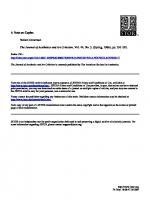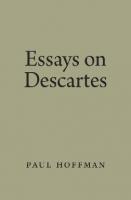
- Author / Uploaded
- Bennett Jonathan
A Note on Descartes and Spinoza
Jonathan Bennett The Philosophical Review, Vol. 74, No. 3. (Jul., 1965), pp. 379-380. Stable URL: http://links.jstor.or
1,276 71 58KB
Pages 3 Page size 595 x 792 pts Year 2007
Recommend Papers
File loading please wait...
Citation preview
A Note on Descartes and Spinoza Jonathan Bennett The Philosophical Review, Vol. 74, No. 3. (Jul., 1965), pp. 379-380. Stable URL: http://links.jstor.org/sici?sici=0031-8108%28196507%2974%3A3%3C379%3AANODAS%3E2.0.CO%3B2-U The Philosophical Review is currently published by Cornell University.
Your use of the JSTOR archive indicates your acceptance of JSTOR's Terms and Conditions of Use, available at http://www.jstor.org/about/terms.html. JSTOR's Terms and Conditions of Use provides, in part, that unless you have obtained prior permission, you may not download an entire issue of a journal or multiple copies of articles, and you may use content in the JSTOR archive only for your personal, non-commercial use. Please contact the publisher regarding any further use of this work. Publisher contact information may be obtained at http://www.jstor.org/journals/sageschool.html. Each copy of any part of a JSTOR transmission must contain the same copyright notice that appears on the screen or printed page of such transmission.
JSTOR is an independent not-for-profit organization dedicated to and preserving a digital archive of scholarly journals. For more information regarding JSTOR, please contact [email protected].
http://www.jstor.org Sun Jun 17 04:51:09 2007
A NOTE O N DESCARTES AND SPINOZA
D
ESCARTES was a dualist and Spinoza a monist. If this marks a contrast between them, there ought to be a question to which Descartes's answer was "two" and Spinoza's "one." (a) How many substances are there? Spinoza: "One." Descartes: "Strictly speaking, one; but if we relax the criteria for substantiality a little, millions." O n no interpretation of the question did Descartes answer, "Two. " (b) How many basic kinds of substance are there? Descartes: "Two." Spinoza: "Two; though there is only one substance, and it is of both kinds." Descartes is usually called a dualist because he took thought and extension to be the two basic, logically independent ways of being; but in this sense Spinoza was a dualist, too. If we take seriously his talk of "infinite" attributes, we may call him a pluralist on this point, but certainly not a monist. (c) Of how many substances does an embodied person consist? Descartes (ignoring his views about the divisibility of matter) : "Two: an embodied person is made u p of a body and a mind, which are distinct substances." Spinoza: "None: an embodied person is a mode (under two attributes) of the one and only substance, and is not made up of any number of substances." Those are the questions which come most readily to mind, and none yields a dualist/monist contrast between Descartes and Spinoza. But:
(d) Given that A and B are basic, logically indejendent attributes, what is the smallest number of substances needed to instantiate both A and B ? T o this Descartes does answer "Two" and Spinoza does answer "One." I suspect that those who "contrast" Descartes and Spinoza as dualist and monist usually have in mind not the genuine contrast brought out by (d) but rather the fact that Descartes answered "Two" to (b) while Spinoza answered "One" to (a). Still, (d) is important in the thinking of both philosophers and in the philosophy of mind generally. Strawson's chapter, "Persons," for example, is interesting partly for its Spinozist answer to (d) : Strawson does not reduce mental predicates to physical, or vice versa, but says that predicates of both kinds may apply to a
JONATHAN BENNETT
single thing, namely a person. O r again, the fashionable theory that mental states may be contingently identical with brain processes is a half-Spinozist fumble with (d) ; but that is a complex matter which I cannot go into here.
Descartes's explicit remarks on question (d) are unsatisfactory: A thing that thinks, [Hobbes] says, may be something corporeal; and the opposite of this has been assumed; notproved. But really I did not assume the opposite, neither did I use it as a basis for my argument; I left it wholly undetermined until Meditation VI, in which the proof is given [Haldane and Ross, 11, 631.
But the "proof" in Meditation Vl, its other defects apart, rests on a premise about the indivisibility of Descartes's mind, and so does not give a general answer to question (d). That Spinoza's answer to (d) is indeed "One" is obvious from the general structure of his metaphysics; but I know of only one place where he says something explicitly on this point. It is thus evident that, though two attributes are conceived as distinctthat is, one without the help of the other-yet we cannot conclude from this that they characterize [apply to, are instantiated by] two entities or two diffar from an absurdity to ascribe several attriferent substances . . It is butes to one substance [Ethics I, 10, note].
. .
.. .
This passage has suffered a curious fate at the hands of the English translators. The word I have translated by "characterize" (and so forth) is "constituere." This has been rendered as "constitute" by Elwes, White, and Willis, and as "form" by Boyle. But why should Spinoza bother to deny that two distinct attributes must form or constitute two distinct substances? Clearly, the point he wishes to make is that two distinct attributes need not apply to, mark off, characterize, two distinct substances. The word "constituere," as the translators might have learned from a good dictionary, can bear that meaning, and in this context it must do so. It is sad that Spinoza's most explicit remark on a point which is important in itself, and which provides the only basis for a genuine monist/dualist contrast between him and Descartes, should have been relevantly mistranslated in every English version of the Ethics. JONATHAN
University of Cambridge
BENNETT









